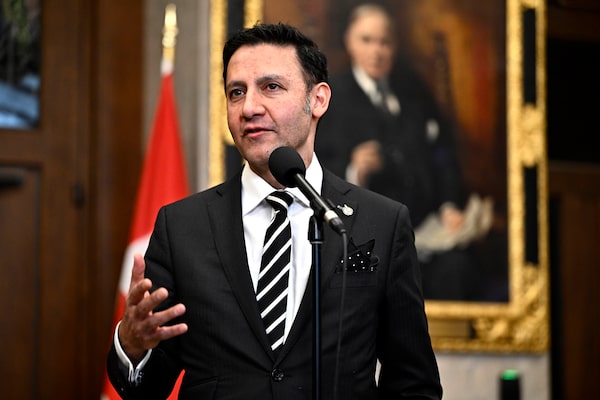
Minister of Justice and Attorney General of Canada Arif Virani responds to questions from reporters in the House of Commons on Parliament Hill in Ottawa on Feb. 29. Virani says that to stop the Canadian Human Rights Commission from being flooded if Bill C-63 becomes law, it would be able to dismiss complaints quickly if they don’t meet the definition of hate speech. Those found to be abusing the process may also have to pay costs under safeguards in the bill, he said.Justin Tang/The Canadian Press
A lawyer who once made a high-profile hate speech complaint against Maclean’s magazine is a member of the tribunal that would rule on hate speech cases under a reinstated power in the government’s online harms bill.
Immigration lawyer Naseem Mithoowani was appointed a part-time member of the Canadian Human Rights Tribunal by the government, serving for five years, in 2021. She is one of the members who stands to hear cases under the Human Rights Act, as the online harms bill, Bill C-63, reinstates a section of the act on hate speech.
The Harper government removed Section 13 in 2013 after the complaints, including against Maclean’s, raised fears about freedom of expression.
The new bill would allow people to complain about hate speech online to the Canadian Human Rights Commission – raising fears of complaints flooding the body. If the commission decides a case has merit, it would forward it to the tribunal, a quasi-judicial body, for a decision on whether a post must be removed and compensation granted.
People found guilty of posting hate speech could have to pay victims up to $20,000 in compensation.
Ms. Mithoowani did not respond to a request for comment. She told MPs on the Commons justice committee in 2019 that she thought Section 13 of the Canadian Human Rights Act (which applied to hate speech communicated through telecommunications) should be reinstated, adding that since its repeal “communities have been left open to attack.”
She lodged a complaint while a law student about the article in Maclean’s entitled The Future Belongs to Islam, by Mark Steyn, an extract from his book posted on the Maclean’s website in 2006.
Law students including Ms. Mithoowani made the case that the article was offensive to Muslims. Serious concerns were raised that it could expose Muslims to hatred or contempt, but the complaint was rejected by the Canadian Human Rights Commission. It decided that the controversial article was obviously calculated to excite and offend some readers, but that did not amount to hate speech.
In 2013, the Harper government removed Section 13, amid fears that it could be used to stifle freedom of expression.
The online harms bill, introduced last month by the government, reinstates it.
Justice Minister Arif Virani said Thursday he “heard loudly and clearly” a demand for reinstating Section 13, but he said it needed to be “calibrated.”
He also said to stop the Canadian Human Rights Commission from being flooded, it would be able to dismiss complaints quickly if they don’t meet the definition of hate speech. Those found to be abusing the process may also have to pay costs under safeguards in the bill, he said.
Bernie Farber, a member of the expert Task Force on Online Harms set up by the government to advise on the creation of the bill, said the few Section 13 cases heard by the tribunal had dealt with the “vilest hate where calls for mass murder of Jews, gays, Muslims, First Nations and others were posted. All other complaints were resolved either through negotiation or dismissal.”
He said its repeal “robbed us of a valuable tool against hate and potential radicalization online.”
David Thomas, a former chairperson of the Canadian Human Rights Tribunal, said he had serious concerns that the bill could have a chilling effect on free speech and freedom of the press.
He also expressed concern that the bill would allow the tribunal to anonymize complaints, with a lower bar than for other tribunal cases.
He said most cases are held in public and the identity of complainants is usually kept secret only if the tribunal believes there is a real possibility that their life, liberty or security could be endangered.
But for hate speech cases, Bill C-63 would allow a complainant’s identity to be kept secret if it is deemed they could be the target of threats, intimidation or discrimination.
Mr. Thomas, a lawyer, who was chairperson of the tribunal from 2014 through 2021, said allowing a lower threshold for hate speech cases could mean “they’re all going to be anonymized.”
“Who’s not going to feel like they’re threatened somehow, right? So now the new normal is going to be secrecy. It won’t be transparent,” he said.
Mr. Thomas said “making the complaint anonymized is a very big deal.”
“The tribunal should be presumptively open and transparent. If you have a complaint against somebody, somebody has a right to know who their accuser is,” he said. “People who make allegations should stand behind those allegations and put their name forward.”
Mr. Virani said he had been advised that there was a need to protect people’s identify through anonymity because “the fear of reprisals was so great, given the amount of reprisals they are already facing.”